An Analysis of Classical Management Theories in Contemporary Business
VerifiedAdded on 2022/09/05
|8
|2148
|23
Essay
AI Summary
This essay provides an in-depth analysis of classical management theories, focusing on scientific management, bureaucratic management, and administrative management. It examines the core principles, strengths, and weaknesses of each theory, drawing on the work of key figures like Taylor, Weber, and Fayol. The essay assesses the relevance of these theories in contemporary business environments, considering their applicability in modern workplaces and their impact on organizational efficiency, employee motivation, and overall productivity. The analysis includes examples of how these theories have been applied in various organizations, such as McDonald's and Ford, and evaluates their adaptability in the face of changing business dynamics and technological advancements. The essay concludes by determining the most useful theory for modern business and the importance of cooperation between workers and managers.
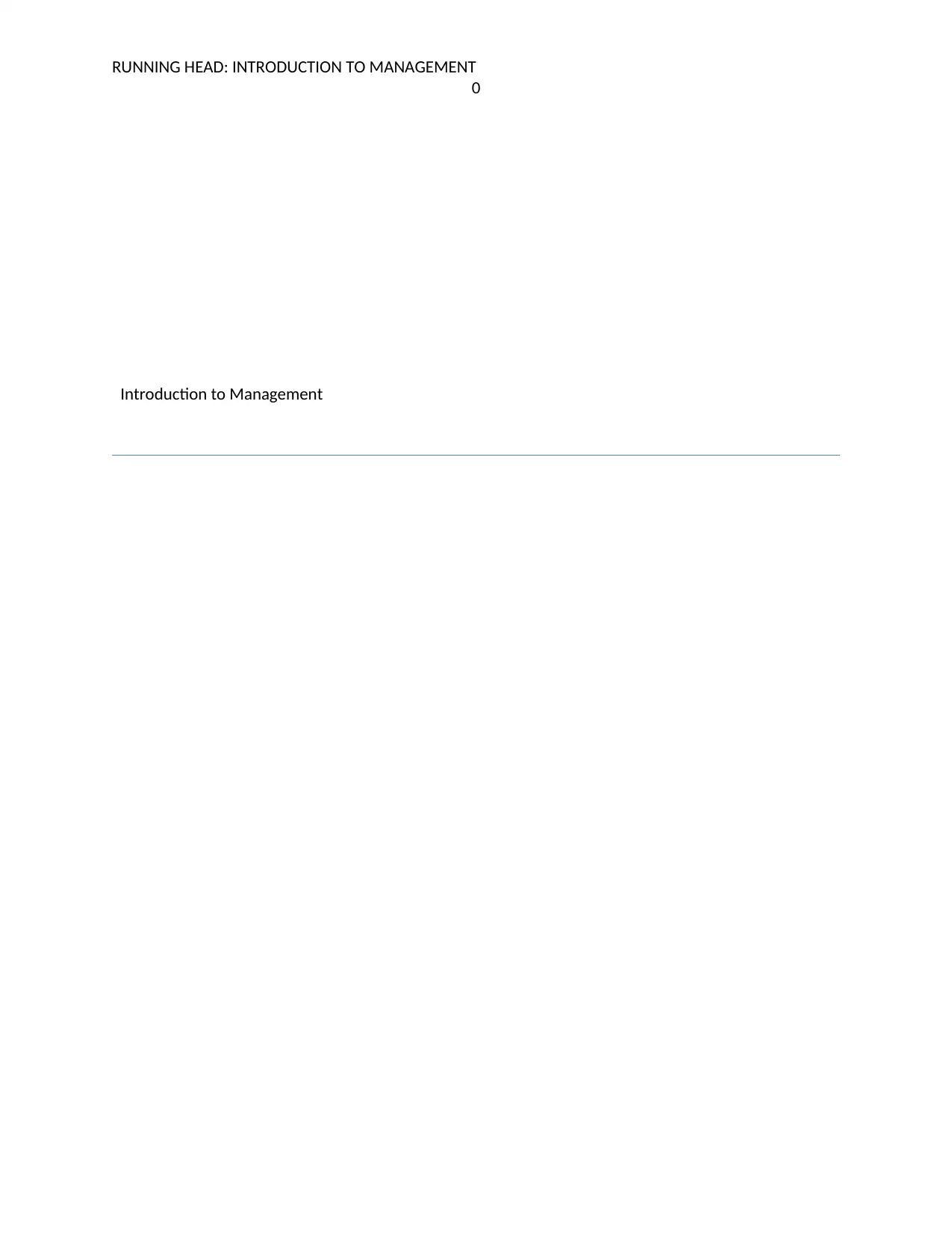
RUNNING HEAD: INTRODUCTION TO MANAGEMENT
0
Introduction to Management
0
Introduction to Management
Paraphrase This Document
Need a fresh take? Get an instant paraphrase of this document with our AI Paraphraser
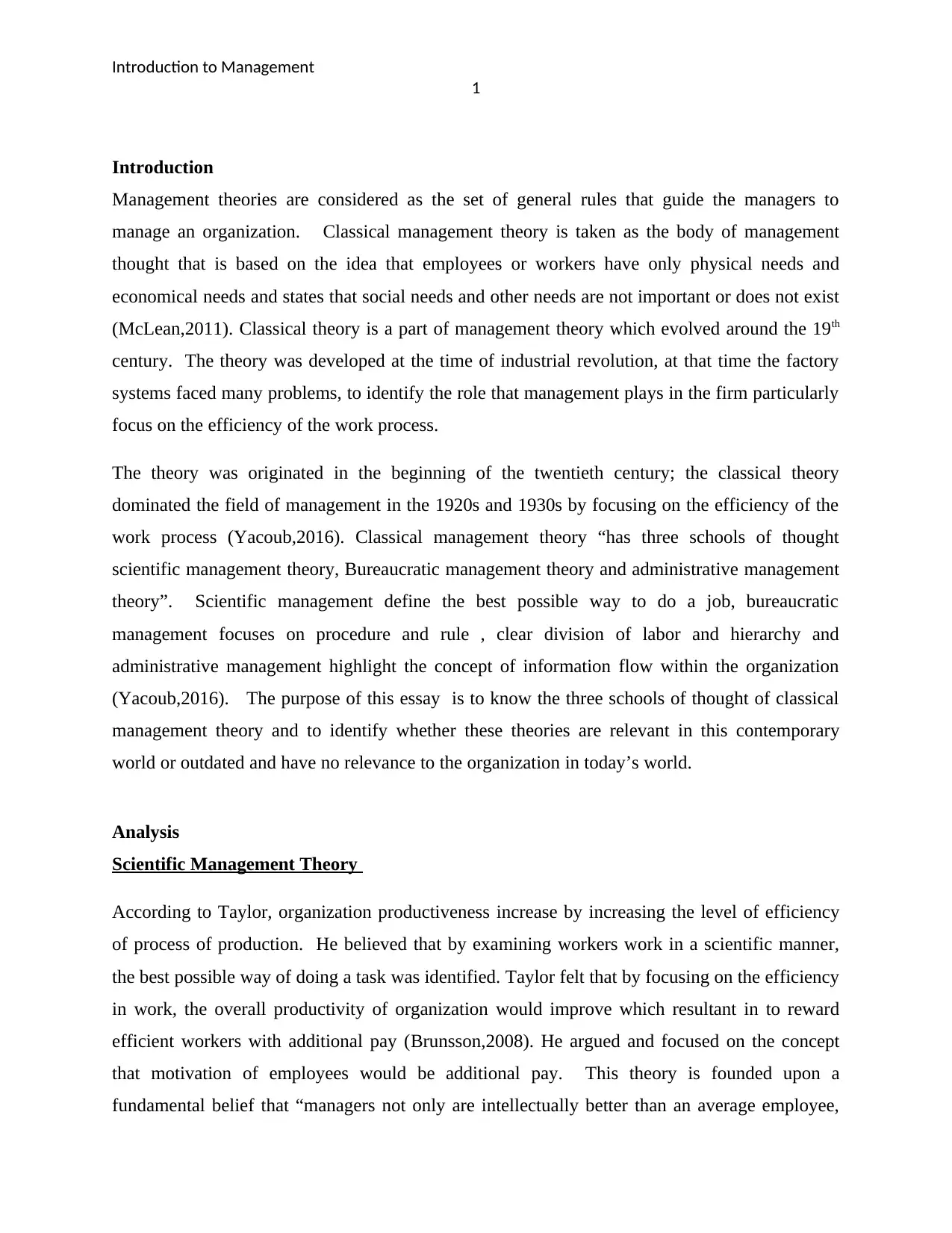
Introduction to Management
1
Introduction
Management theories are considered as the set of general rules that guide the managers to
manage an organization. Classical management theory is taken as the body of management
thought that is based on the idea that employees or workers have only physical needs and
economical needs and states that social needs and other needs are not important or does not exist
(McLean,2011). Classical theory is a part of management theory which evolved around the 19th
century. The theory was developed at the time of industrial revolution, at that time the factory
systems faced many problems, to identify the role that management plays in the firm particularly
focus on the efficiency of the work process.
The theory was originated in the beginning of the twentieth century; the classical theory
dominated the field of management in the 1920s and 1930s by focusing on the efficiency of the
work process (Yacoub,2016). Classical management theory “has three schools of thought
scientific management theory, Bureaucratic management theory and administrative management
theory”. Scientific management define the best possible way to do a job, bureaucratic
management focuses on procedure and rule , clear division of labor and hierarchy and
administrative management highlight the concept of information flow within the organization
(Yacoub,2016). The purpose of this essay is to know the three schools of thought of classical
management theory and to identify whether these theories are relevant in this contemporary
world or outdated and have no relevance to the organization in today’s world.
Analysis
Scientific Management Theory
According to Taylor, organization productiveness increase by increasing the level of efficiency
of process of production. He believed that by examining workers work in a scientific manner,
the best possible way of doing a task was identified. Taylor felt that by focusing on the efficiency
in work, the overall productivity of organization would improve which resultant in to reward
efficient workers with additional pay (Brunsson,2008). He argued and focused on the concept
that motivation of employees would be additional pay. This theory is founded upon a
fundamental belief that “managers not only are intellectually better than an average employee,
1
Introduction
Management theories are considered as the set of general rules that guide the managers to
manage an organization. Classical management theory is taken as the body of management
thought that is based on the idea that employees or workers have only physical needs and
economical needs and states that social needs and other needs are not important or does not exist
(McLean,2011). Classical theory is a part of management theory which evolved around the 19th
century. The theory was developed at the time of industrial revolution, at that time the factory
systems faced many problems, to identify the role that management plays in the firm particularly
focus on the efficiency of the work process.
The theory was originated in the beginning of the twentieth century; the classical theory
dominated the field of management in the 1920s and 1930s by focusing on the efficiency of the
work process (Yacoub,2016). Classical management theory “has three schools of thought
scientific management theory, Bureaucratic management theory and administrative management
theory”. Scientific management define the best possible way to do a job, bureaucratic
management focuses on procedure and rule , clear division of labor and hierarchy and
administrative management highlight the concept of information flow within the organization
(Yacoub,2016). The purpose of this essay is to know the three schools of thought of classical
management theory and to identify whether these theories are relevant in this contemporary
world or outdated and have no relevance to the organization in today’s world.
Analysis
Scientific Management Theory
According to Taylor, organization productiveness increase by increasing the level of efficiency
of process of production. He believed that by examining workers work in a scientific manner,
the best possible way of doing a task was identified. Taylor felt that by focusing on the efficiency
in work, the overall productivity of organization would improve which resultant in to reward
efficient workers with additional pay (Brunsson,2008). He argued and focused on the concept
that motivation of employees would be additional pay. This theory is founded upon a
fundamental belief that “managers not only are intellectually better than an average employee,
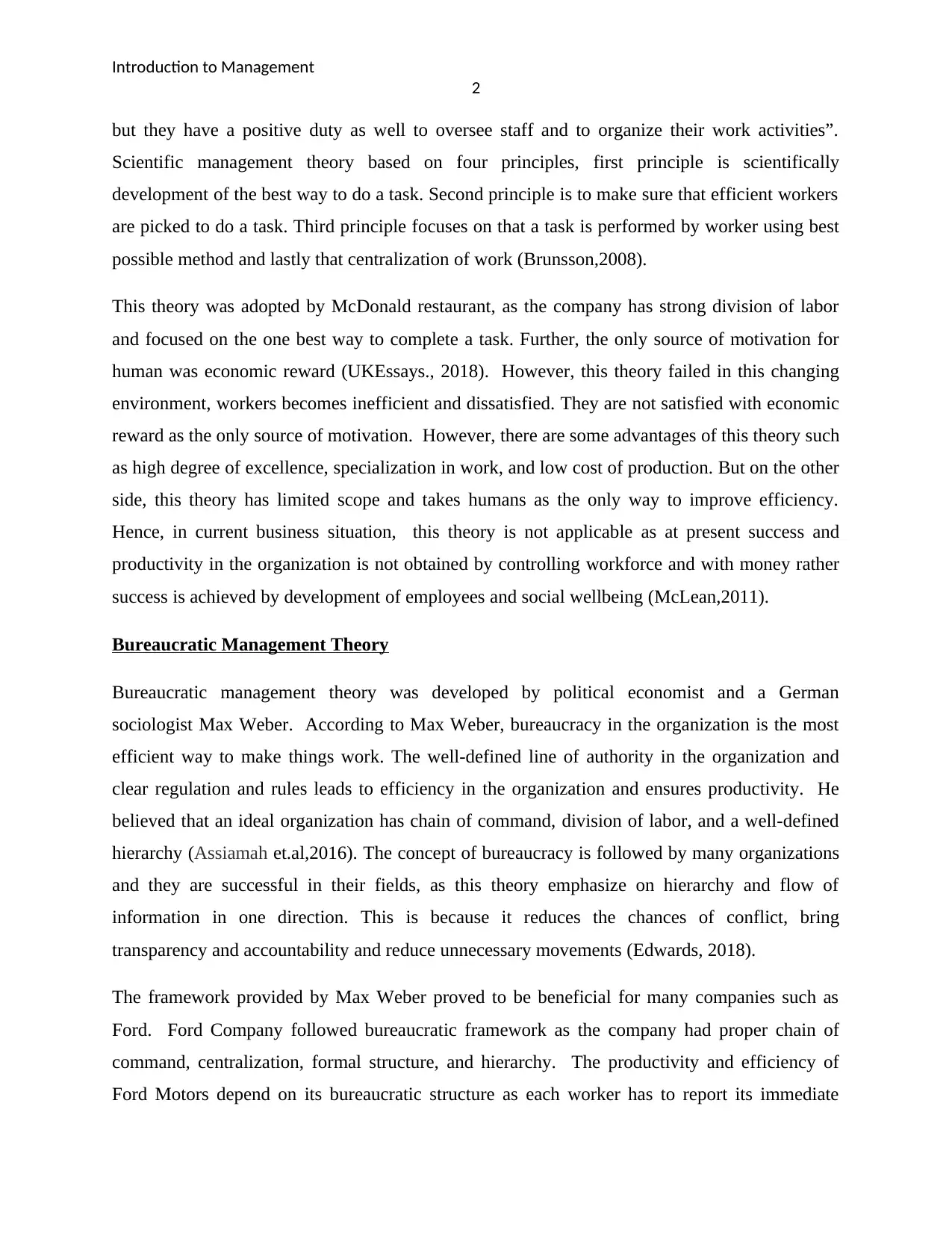
Introduction to Management
2
but they have a positive duty as well to oversee staff and to organize their work activities”.
Scientific management theory based on four principles, first principle is scientifically
development of the best way to do a task. Second principle is to make sure that efficient workers
are picked to do a task. Third principle focuses on that a task is performed by worker using best
possible method and lastly that centralization of work (Brunsson,2008).
This theory was adopted by McDonald restaurant, as the company has strong division of labor
and focused on the one best way to complete a task. Further, the only source of motivation for
human was economic reward (UKEssays., 2018). However, this theory failed in this changing
environment, workers becomes inefficient and dissatisfied. They are not satisfied with economic
reward as the only source of motivation. However, there are some advantages of this theory such
as high degree of excellence, specialization in work, and low cost of production. But on the other
side, this theory has limited scope and takes humans as the only way to improve efficiency.
Hence, in current business situation, this theory is not applicable as at present success and
productivity in the organization is not obtained by controlling workforce and with money rather
success is achieved by development of employees and social wellbeing (McLean,2011).
Bureaucratic Management Theory
Bureaucratic management theory was developed by political economist and a German
sociologist Max Weber. According to Max Weber, bureaucracy in the organization is the most
efficient way to make things work. The well-defined line of authority in the organization and
clear regulation and rules leads to efficiency in the organization and ensures productivity. He
believed that an ideal organization has chain of command, division of labor, and a well-defined
hierarchy (Assiamah et.al,2016). The concept of bureaucracy is followed by many organizations
and they are successful in their fields, as this theory emphasize on hierarchy and flow of
information in one direction. This is because it reduces the chances of conflict, bring
transparency and accountability and reduce unnecessary movements (Edwards, 2018).
The framework provided by Max Weber proved to be beneficial for many companies such as
Ford. Ford Company followed bureaucratic framework as the company had proper chain of
command, centralization, formal structure, and hierarchy. The productivity and efficiency of
Ford Motors depend on its bureaucratic structure as each worker has to report its immediate
2
but they have a positive duty as well to oversee staff and to organize their work activities”.
Scientific management theory based on four principles, first principle is scientifically
development of the best way to do a task. Second principle is to make sure that efficient workers
are picked to do a task. Third principle focuses on that a task is performed by worker using best
possible method and lastly that centralization of work (Brunsson,2008).
This theory was adopted by McDonald restaurant, as the company has strong division of labor
and focused on the one best way to complete a task. Further, the only source of motivation for
human was economic reward (UKEssays., 2018). However, this theory failed in this changing
environment, workers becomes inefficient and dissatisfied. They are not satisfied with economic
reward as the only source of motivation. However, there are some advantages of this theory such
as high degree of excellence, specialization in work, and low cost of production. But on the other
side, this theory has limited scope and takes humans as the only way to improve efficiency.
Hence, in current business situation, this theory is not applicable as at present success and
productivity in the organization is not obtained by controlling workforce and with money rather
success is achieved by development of employees and social wellbeing (McLean,2011).
Bureaucratic Management Theory
Bureaucratic management theory was developed by political economist and a German
sociologist Max Weber. According to Max Weber, bureaucracy in the organization is the most
efficient way to make things work. The well-defined line of authority in the organization and
clear regulation and rules leads to efficiency in the organization and ensures productivity. He
believed that an ideal organization has chain of command, division of labor, and a well-defined
hierarchy (Assiamah et.al,2016). The concept of bureaucracy is followed by many organizations
and they are successful in their fields, as this theory emphasize on hierarchy and flow of
information in one direction. This is because it reduces the chances of conflict, bring
transparency and accountability and reduce unnecessary movements (Edwards, 2018).
The framework provided by Max Weber proved to be beneficial for many companies such as
Ford. Ford Company followed bureaucratic framework as the company had proper chain of
command, centralization, formal structure, and hierarchy. The productivity and efficiency of
Ford Motors depend on its bureaucratic structure as each worker has to report its immediate
⊘ This is a preview!⊘
Do you want full access?
Subscribe today to unlock all pages.

Trusted by 1+ million students worldwide
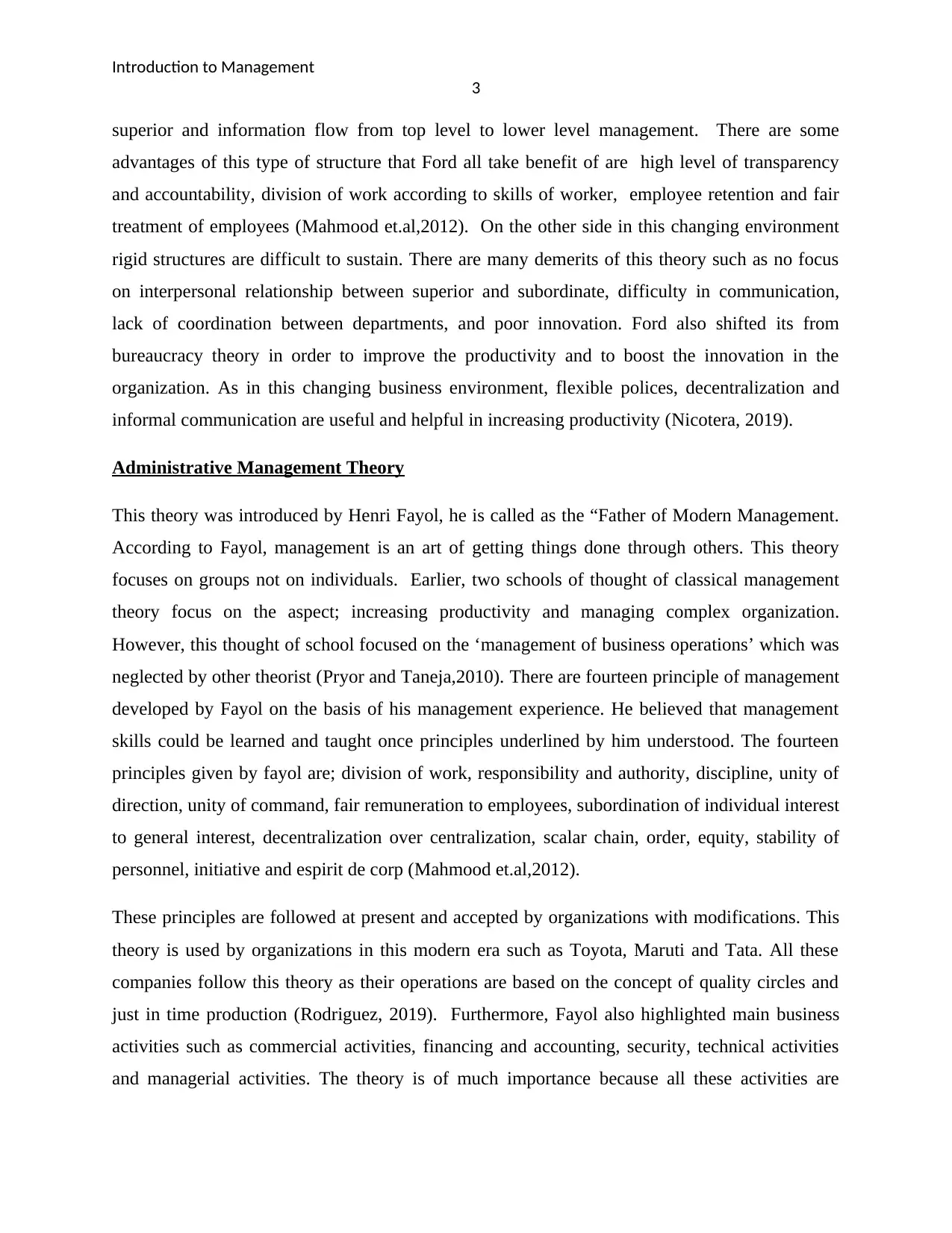
Introduction to Management
3
superior and information flow from top level to lower level management. There are some
advantages of this type of structure that Ford all take benefit of are high level of transparency
and accountability, division of work according to skills of worker, employee retention and fair
treatment of employees (Mahmood et.al,2012). On the other side in this changing environment
rigid structures are difficult to sustain. There are many demerits of this theory such as no focus
on interpersonal relationship between superior and subordinate, difficulty in communication,
lack of coordination between departments, and poor innovation. Ford also shifted its from
bureaucracy theory in order to improve the productivity and to boost the innovation in the
organization. As in this changing business environment, flexible polices, decentralization and
informal communication are useful and helpful in increasing productivity (Nicotera, 2019).
Administrative Management Theory
This theory was introduced by Henri Fayol, he is called as the “Father of Modern Management.
According to Fayol, management is an art of getting things done through others. This theory
focuses on groups not on individuals. Earlier, two schools of thought of classical management
theory focus on the aspect; increasing productivity and managing complex organization.
However, this thought of school focused on the ‘management of business operations’ which was
neglected by other theorist (Pryor and Taneja,2010). There are fourteen principle of management
developed by Fayol on the basis of his management experience. He believed that management
skills could be learned and taught once principles underlined by him understood. The fourteen
principles given by fayol are; division of work, responsibility and authority, discipline, unity of
direction, unity of command, fair remuneration to employees, subordination of individual interest
to general interest, decentralization over centralization, scalar chain, order, equity, stability of
personnel, initiative and espirit de corp (Mahmood et.al,2012).
These principles are followed at present and accepted by organizations with modifications. This
theory is used by organizations in this modern era such as Toyota, Maruti and Tata. All these
companies follow this theory as their operations are based on the concept of quality circles and
just in time production (Rodriguez, 2019). Furthermore, Fayol also highlighted main business
activities such as commercial activities, financing and accounting, security, technical activities
and managerial activities. The theory is of much importance because all these activities are
3
superior and information flow from top level to lower level management. There are some
advantages of this type of structure that Ford all take benefit of are high level of transparency
and accountability, division of work according to skills of worker, employee retention and fair
treatment of employees (Mahmood et.al,2012). On the other side in this changing environment
rigid structures are difficult to sustain. There are many demerits of this theory such as no focus
on interpersonal relationship between superior and subordinate, difficulty in communication,
lack of coordination between departments, and poor innovation. Ford also shifted its from
bureaucracy theory in order to improve the productivity and to boost the innovation in the
organization. As in this changing business environment, flexible polices, decentralization and
informal communication are useful and helpful in increasing productivity (Nicotera, 2019).
Administrative Management Theory
This theory was introduced by Henri Fayol, he is called as the “Father of Modern Management.
According to Fayol, management is an art of getting things done through others. This theory
focuses on groups not on individuals. Earlier, two schools of thought of classical management
theory focus on the aspect; increasing productivity and managing complex organization.
However, this thought of school focused on the ‘management of business operations’ which was
neglected by other theorist (Pryor and Taneja,2010). There are fourteen principle of management
developed by Fayol on the basis of his management experience. He believed that management
skills could be learned and taught once principles underlined by him understood. The fourteen
principles given by fayol are; division of work, responsibility and authority, discipline, unity of
direction, unity of command, fair remuneration to employees, subordination of individual interest
to general interest, decentralization over centralization, scalar chain, order, equity, stability of
personnel, initiative and espirit de corp (Mahmood et.al,2012).
These principles are followed at present and accepted by organizations with modifications. This
theory is used by organizations in this modern era such as Toyota, Maruti and Tata. All these
companies follow this theory as their operations are based on the concept of quality circles and
just in time production (Rodriguez, 2019). Furthermore, Fayol also highlighted main business
activities such as commercial activities, financing and accounting, security, technical activities
and managerial activities. The theory is of much importance because all these activities are
Paraphrase This Document
Need a fresh take? Get an instant paraphrase of this document with our AI Paraphraser
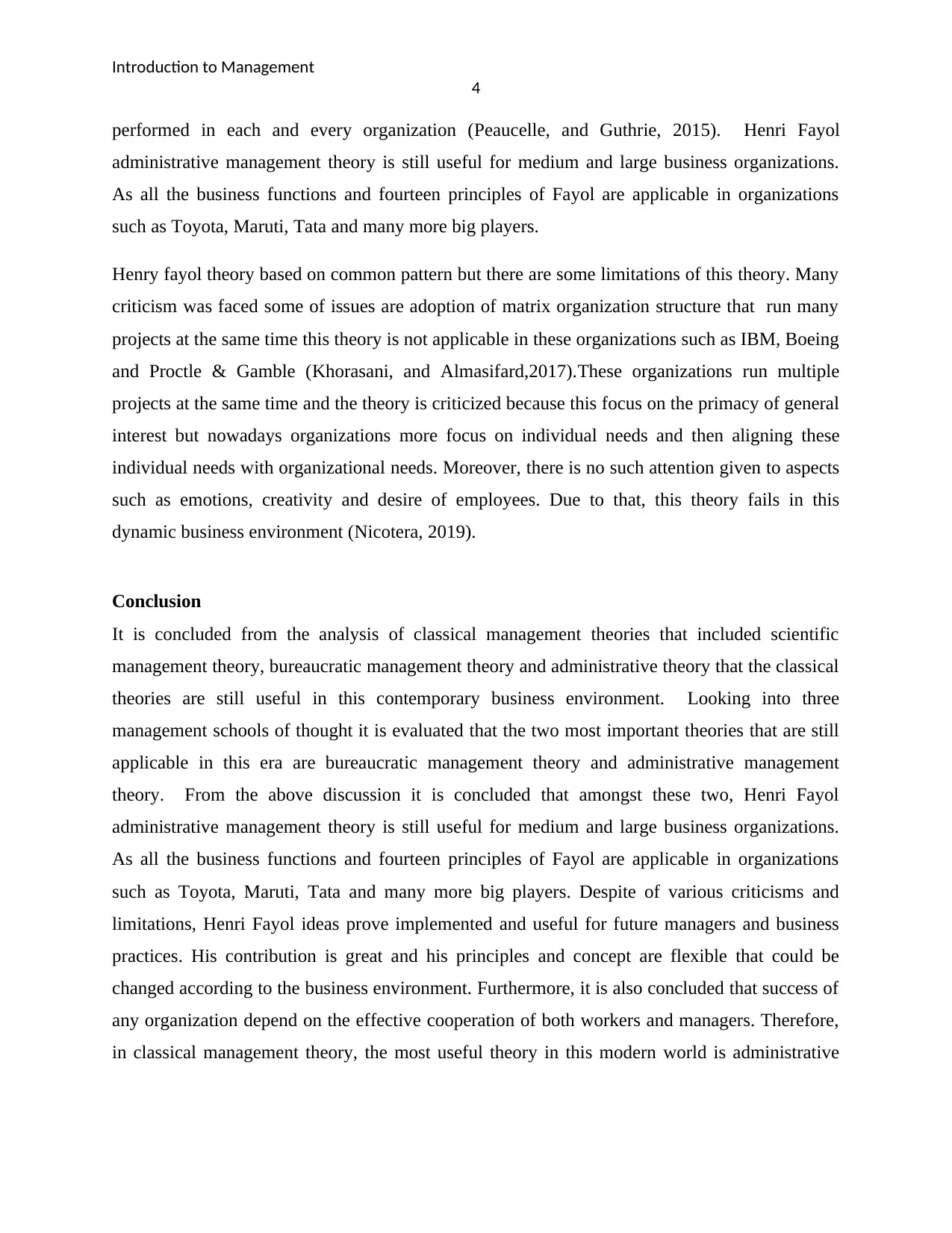
Introduction to Management
4
performed in each and every organization (Peaucelle, and Guthrie, 2015). Henri Fayol
administrative management theory is still useful for medium and large business organizations.
As all the business functions and fourteen principles of Fayol are applicable in organizations
such as Toyota, Maruti, Tata and many more big players.
Henry fayol theory based on common pattern but there are some limitations of this theory. Many
criticism was faced some of issues are adoption of matrix organization structure that run many
projects at the same time this theory is not applicable in these organizations such as IBM, Boeing
and Proctle & Gamble (Khorasani, and Almasifard,2017).These organizations run multiple
projects at the same time and the theory is criticized because this focus on the primacy of general
interest but nowadays organizations more focus on individual needs and then aligning these
individual needs with organizational needs. Moreover, there is no such attention given to aspects
such as emotions, creativity and desire of employees. Due to that, this theory fails in this
dynamic business environment (Nicotera, 2019).
Conclusion
It is concluded from the analysis of classical management theories that included scientific
management theory, bureaucratic management theory and administrative theory that the classical
theories are still useful in this contemporary business environment. Looking into three
management schools of thought it is evaluated that the two most important theories that are still
applicable in this era are bureaucratic management theory and administrative management
theory. From the above discussion it is concluded that amongst these two, Henri Fayol
administrative management theory is still useful for medium and large business organizations.
As all the business functions and fourteen principles of Fayol are applicable in organizations
such as Toyota, Maruti, Tata and many more big players. Despite of various criticisms and
limitations, Henri Fayol ideas prove implemented and useful for future managers and business
practices. His contribution is great and his principles and concept are flexible that could be
changed according to the business environment. Furthermore, it is also concluded that success of
any organization depend on the effective cooperation of both workers and managers. Therefore,
in classical management theory, the most useful theory in this modern world is administrative
4
performed in each and every organization (Peaucelle, and Guthrie, 2015). Henri Fayol
administrative management theory is still useful for medium and large business organizations.
As all the business functions and fourteen principles of Fayol are applicable in organizations
such as Toyota, Maruti, Tata and many more big players.
Henry fayol theory based on common pattern but there are some limitations of this theory. Many
criticism was faced some of issues are adoption of matrix organization structure that run many
projects at the same time this theory is not applicable in these organizations such as IBM, Boeing
and Proctle & Gamble (Khorasani, and Almasifard,2017).These organizations run multiple
projects at the same time and the theory is criticized because this focus on the primacy of general
interest but nowadays organizations more focus on individual needs and then aligning these
individual needs with organizational needs. Moreover, there is no such attention given to aspects
such as emotions, creativity and desire of employees. Due to that, this theory fails in this
dynamic business environment (Nicotera, 2019).
Conclusion
It is concluded from the analysis of classical management theories that included scientific
management theory, bureaucratic management theory and administrative theory that the classical
theories are still useful in this contemporary business environment. Looking into three
management schools of thought it is evaluated that the two most important theories that are still
applicable in this era are bureaucratic management theory and administrative management
theory. From the above discussion it is concluded that amongst these two, Henri Fayol
administrative management theory is still useful for medium and large business organizations.
As all the business functions and fourteen principles of Fayol are applicable in organizations
such as Toyota, Maruti, Tata and many more big players. Despite of various criticisms and
limitations, Henri Fayol ideas prove implemented and useful for future managers and business
practices. His contribution is great and his principles and concept are flexible that could be
changed according to the business environment. Furthermore, it is also concluded that success of
any organization depend on the effective cooperation of both workers and managers. Therefore,
in classical management theory, the most useful theory in this modern world is administrative
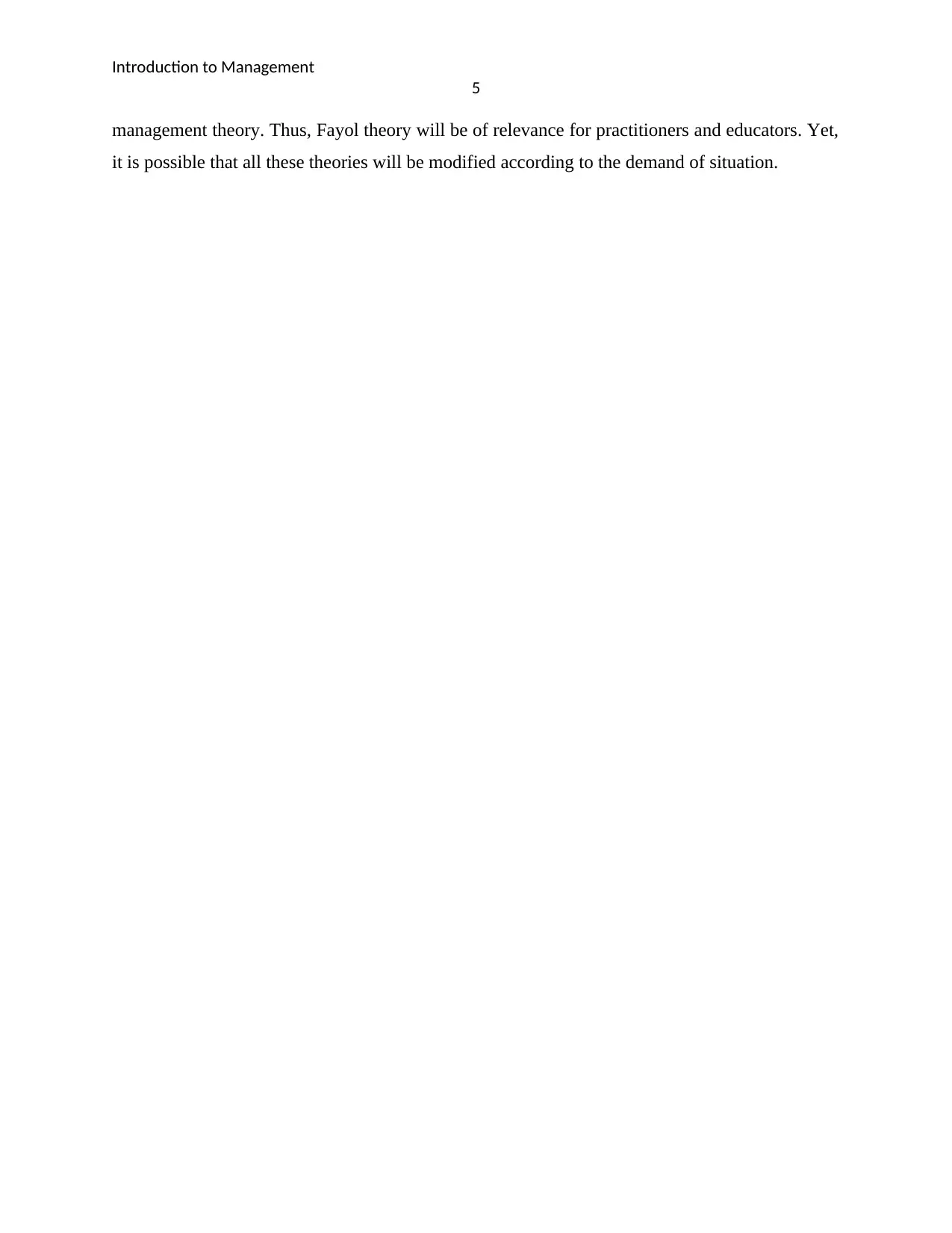
Introduction to Management
5
management theory. Thus, Fayol theory will be of relevance for practitioners and educators. Yet,
it is possible that all these theories will be modified according to the demand of situation.
5
management theory. Thus, Fayol theory will be of relevance for practitioners and educators. Yet,
it is possible that all these theories will be modified according to the demand of situation.
⊘ This is a preview!⊘
Do you want full access?
Subscribe today to unlock all pages.

Trusted by 1+ million students worldwide
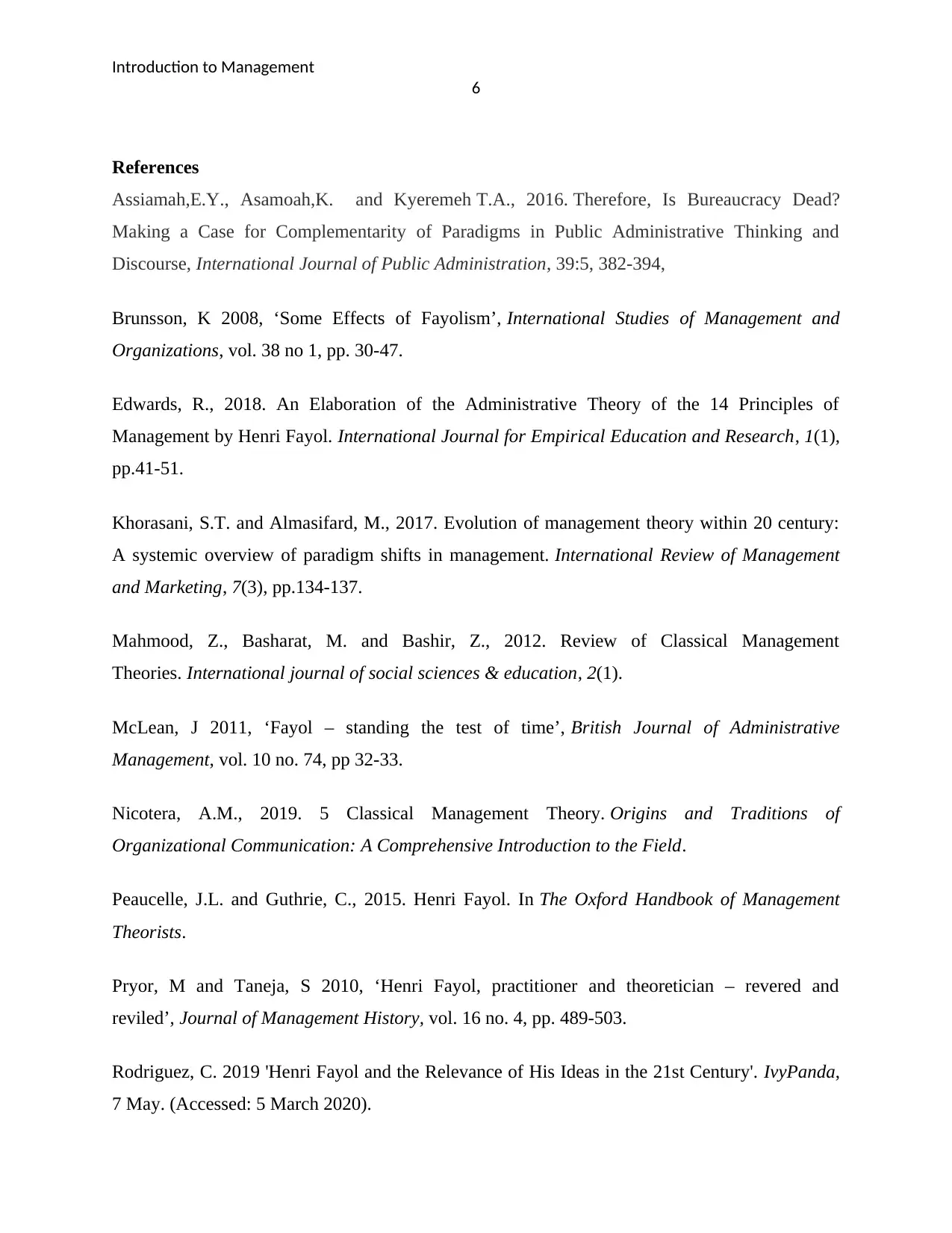
Introduction to Management
6
References
Assiamah,E.Y., Asamoah,K. and Kyeremeh T.A., 2016. Therefore, Is Bureaucracy Dead?
Making a Case for Complementarity of Paradigms in Public Administrative Thinking and
Discourse, International Journal of Public Administration, 39:5, 382-394,
Brunsson, K 2008, ‘Some Effects of Fayolism’, International Studies of Management and
Organizations, vol. 38 no 1, pp. 30-47.
Edwards, R., 2018. An Elaboration of the Administrative Theory of the 14 Principles of
Management by Henri Fayol. International Journal for Empirical Education and Research, 1(1),
pp.41-51.
Khorasani, S.T. and Almasifard, M., 2017. Evolution of management theory within 20 century:
A systemic overview of paradigm shifts in management. International Review of Management
and Marketing, 7(3), pp.134-137.
Mahmood, Z., Basharat, M. and Bashir, Z., 2012. Review of Classical Management
Theories. International journal of social sciences & education, 2(1).
McLean, J 2011, ‘Fayol – standing the test of time’, British Journal of Administrative
Management, vol. 10 no. 74, pp 32-33.
Nicotera, A.M., 2019. 5 Classical Management Theory. Origins and Traditions of
Organizational Communication: A Comprehensive Introduction to the Field.
Peaucelle, J.L. and Guthrie, C., 2015. Henri Fayol. In The Oxford Handbook of Management
Theorists.
Pryor, M and Taneja, S 2010, ‘Henri Fayol, practitioner and theoretician – revered and
reviled’, Journal of Management History, vol. 16 no. 4, pp. 489-503.
Rodriguez, C. 2019 'Henri Fayol and the Relevance of His Ideas in the 21st Century'. IvyPanda,
7 May. (Accessed: 5 March 2020).
6
References
Assiamah,E.Y., Asamoah,K. and Kyeremeh T.A., 2016. Therefore, Is Bureaucracy Dead?
Making a Case for Complementarity of Paradigms in Public Administrative Thinking and
Discourse, International Journal of Public Administration, 39:5, 382-394,
Brunsson, K 2008, ‘Some Effects of Fayolism’, International Studies of Management and
Organizations, vol. 38 no 1, pp. 30-47.
Edwards, R., 2018. An Elaboration of the Administrative Theory of the 14 Principles of
Management by Henri Fayol. International Journal for Empirical Education and Research, 1(1),
pp.41-51.
Khorasani, S.T. and Almasifard, M., 2017. Evolution of management theory within 20 century:
A systemic overview of paradigm shifts in management. International Review of Management
and Marketing, 7(3), pp.134-137.
Mahmood, Z., Basharat, M. and Bashir, Z., 2012. Review of Classical Management
Theories. International journal of social sciences & education, 2(1).
McLean, J 2011, ‘Fayol – standing the test of time’, British Journal of Administrative
Management, vol. 10 no. 74, pp 32-33.
Nicotera, A.M., 2019. 5 Classical Management Theory. Origins and Traditions of
Organizational Communication: A Comprehensive Introduction to the Field.
Peaucelle, J.L. and Guthrie, C., 2015. Henri Fayol. In The Oxford Handbook of Management
Theorists.
Pryor, M and Taneja, S 2010, ‘Henri Fayol, practitioner and theoretician – revered and
reviled’, Journal of Management History, vol. 16 no. 4, pp. 489-503.
Rodriguez, C. 2019 'Henri Fayol and the Relevance of His Ideas in the 21st Century'. IvyPanda,
7 May. (Accessed: 5 March 2020).
Paraphrase This Document
Need a fresh take? Get an instant paraphrase of this document with our AI Paraphraser
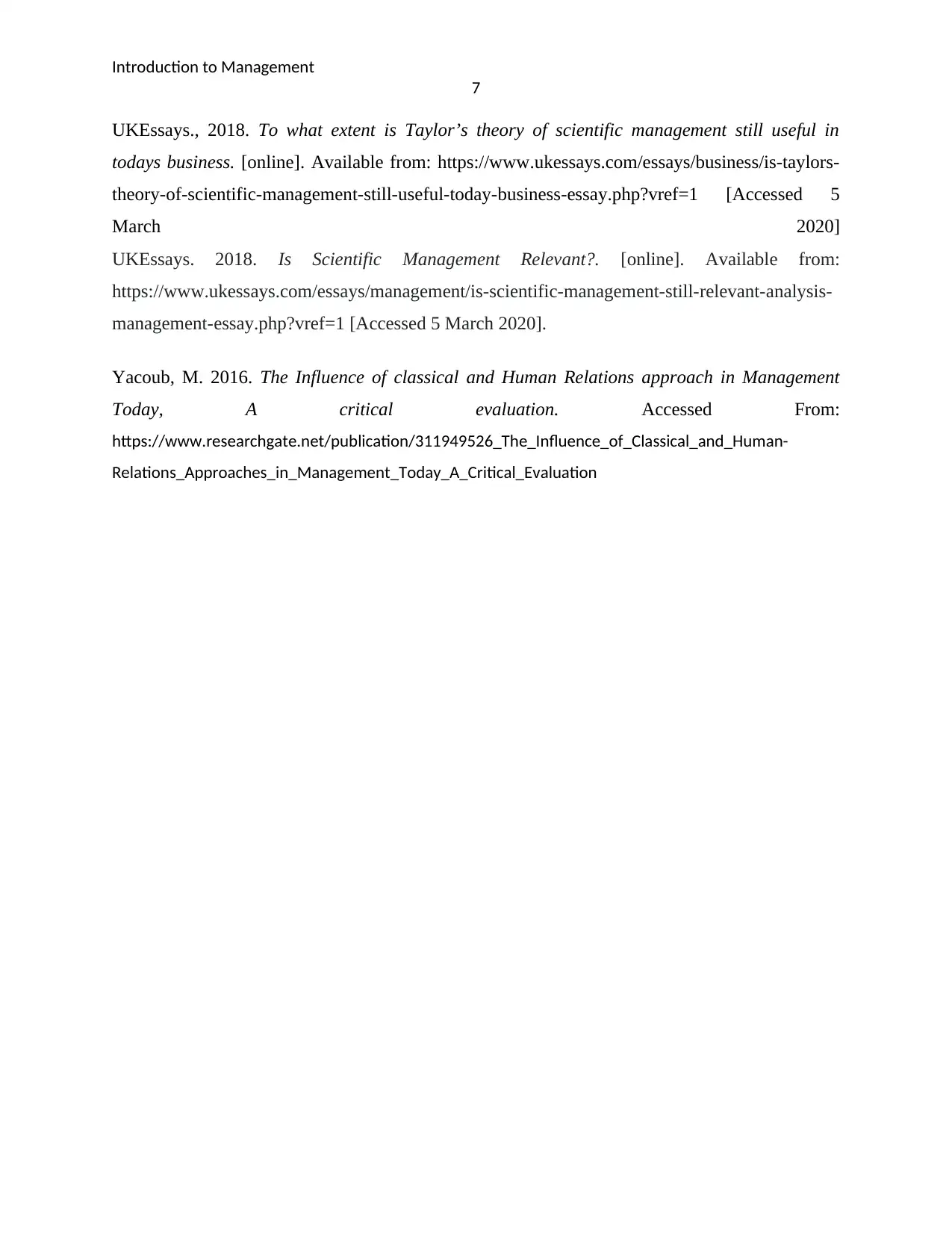
Introduction to Management
7
UKEssays., 2018. To what extent is Taylor’s theory of scientific management still useful in
todays business. [online]. Available from: https://www.ukessays.com/essays/business/is-taylors-
theory-of-scientific-management-still-useful-today-business-essay.php?vref=1 [Accessed 5
March 2020]
UKEssays. 2018. Is Scientific Management Relevant?. [online]. Available from:
https://www.ukessays.com/essays/management/is-scientific-management-still-relevant-analysis-
management-essay.php?vref=1 [Accessed 5 March 2020].
Yacoub, M. 2016. The Influence of classical and Human Relations approach in Management
Today, A critical evaluation. Accessed From:
https://www.researchgate.net/publication/311949526_The_Influence_of_Classical_and_Human-
Relations_Approaches_in_Management_Today_A_Critical_Evaluation
7
UKEssays., 2018. To what extent is Taylor’s theory of scientific management still useful in
todays business. [online]. Available from: https://www.ukessays.com/essays/business/is-taylors-
theory-of-scientific-management-still-useful-today-business-essay.php?vref=1 [Accessed 5
March 2020]
UKEssays. 2018. Is Scientific Management Relevant?. [online]. Available from:
https://www.ukessays.com/essays/management/is-scientific-management-still-relevant-analysis-
management-essay.php?vref=1 [Accessed 5 March 2020].
Yacoub, M. 2016. The Influence of classical and Human Relations approach in Management
Today, A critical evaluation. Accessed From:
https://www.researchgate.net/publication/311949526_The_Influence_of_Classical_and_Human-
Relations_Approaches_in_Management_Today_A_Critical_Evaluation
1 out of 8
Related Documents
Your All-in-One AI-Powered Toolkit for Academic Success.
+13062052269
info@desklib.com
Available 24*7 on WhatsApp / Email
![[object Object]](/_next/static/media/star-bottom.7253800d.svg)
Unlock your academic potential
Copyright © 2020–2025 A2Z Services. All Rights Reserved. Developed and managed by ZUCOL.





